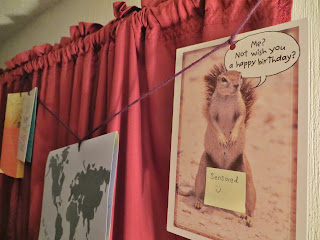This past week I’ve been grateful for these
people at Clínica Salvatore:
there's 3 people missing, but here's a good picture of some of the staff in Palín!
Am loving being a part of this group of
people more and more, because they reach out in so many ways to their
community. I think I may have found my
calling to the Community Health field of nursing!
Each month both doctors and usually a nurse
and maybe a dentist get in a little plane and fly to the mountains of Quiché to
a little farm town called La Perla. Last month I got to join them, and this
month I get to go again! The only downside to this month’s trip is that the
plane’s engine is getting worked on, so we will all have to take a van. With
the plane, the trip is 45 minutes. By car, it is going to take us 11 hours
because of all the wild curvy roads and mountainous terrain the vehicle has to
get through. I am really dreading the travelling (I will be sure to take some
Dramamine!), but it will help that we’ll stop halfway to sleep somewhere. Here’s
some photos from February’s trip:
This past week, Clínica Salvatore had a
great opportunity to take their work outside the clinic again and hold a clinic
for the workers of a large textile plant (they make clothes for Target and Kohl's in the States!). It was held Monday through Friday for
an hour in the evenings, and I was able to get a ride with the Doctor two of
those nights. This was a great blessing for the workers because the cost of
their visit was very low, and any medicine prescribed to them was free! Also,
it was a great blessing for Clínica Salvatore because it got the word out about
us to more people in the community.
A couple weeks ago, I got to join my friend
Patty, who is also a nurse, in visiting the elementary school right in front of
the clinic. Our mission was to address each grade’s classroom about parasitic
worms and how to prevent getting them. Sadly, probably every child in that
school has worms living inside their stomach right now or has had them many
times in the past. Infections from parasites, which are caused by little worms
finding a way to live inside your intestinal wall, are incredibly common in the
rural areas here because poor sanitation and poor hygiene is prevalent.
Families live in poverty—in homes made from cement blocks with tin or tarp
roofs and dirt floors. All kinds of animals mill about the neighborhood, so of
course it wouldn’t be uncommon for a child playing outside to come into contact
with animal poop. Parasites can also get into the intestine by eating uncooked
or unwashed food, contaminated water or hands, or by skin contact with
larva-infected soil. Children are especially susceptible. A child with
parasites will come to the clinic experiencing diarrhea, abdominal pain, fever,
and weakness.
Patty and I talked to the kids about
parasites and how they’re caused, demonstrated how to properly wash hands,
and went around asking each child to open their mouth so we could drop a little
white pill inside, called Albendazole. It was sad and ironic that at the same
time we were going around educating each grade about how to prevent worms, the
other kids were lining up outside for breakfast which arrived in two big pots:
hot coffee and spaghetti. None of the children had washed their hands (I’m not
sure if there was actually any running water in the school—I forgot to check—and
of course nobody was whippin hand sanitizer out of their backpacks!), and no
one was using utensils. With dirty hands, they were reaching into their little
bowls of spaghetti and putting it into their mouths. You guessed it. More
parasites.
Ahh… Clearly, we are not done health
educating here! Being a nurse in a developing country has taught me that I need
to remember to be patient with individuals and communities who are still
learning how to live healthier lives. They are wise and intelligent people, but
a lot of times things like a basic health education or basic tools/medicines
that help us prevent or manage disease are not readily available to or
affordable for them, such as scales, blood-glucose monitors, vitamins, fluoride
toothpaste, vision screenings…the list is endless. Whereas I have had things
like brushing my teeth 3 times a day engrained in my mind because my parents
and teachers taught me to do that all the time as a kid, the children here do
not learn those basic things. Priorities are placed elsewhere, not
intentionally, but maybe because the little money made needs to be spent on
food, not toothbrushes and toothpaste.
This is the reality that I see every day,
and it breaks my heart that people suffer because they lack things that I have
always had in abundance! Heck, I’ve always had like 3 different kinds of shampoo
at the same time in my shower back home. Here, my experience in this country is not
only teaching me how to be a more culturally-sensitive and health
education-emphasizing nurse, but how to just be a simpler person in general. What
am I spending my money on? How much do I spend on things I don’t need? What is
most important to me? What material things can I cut down on? Who can I bless
with my things or my money or my time this week?
As Zach and I ask ourselves those
questions, I challenge you to ask yourself those questions, too! How much more
could we do with less?
Thanks for reading, amigos :)
Kristen
























